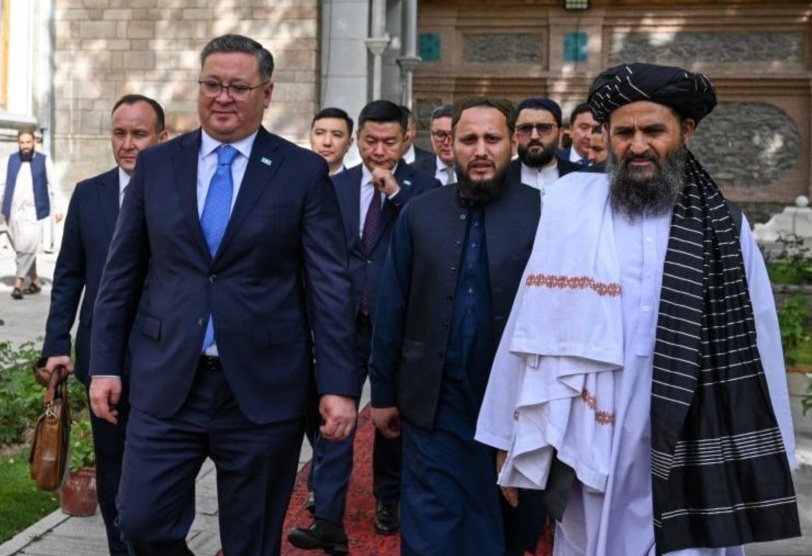Infrastructure and trade: the Central Asian route to Kabul
Although it has not yet achieved full political recognition from Moscow, Kazakhstan has signed an agreement with the Taliban for an important railway line. Uzbekistan, Kyrgyzstan and Turkmenistan are also promoting agreements with Beijing's blessing. The only exception remains Tajikistan, where the issue of discrimination against the Tajik minority in Afghanistan still weighs heavily.
Astana (AsiaNews) - Russia has recognised the Islamic Emirate of Afghanistan, which returned to power in Kabul four years ago, while Central Asian countries are not rushing to join in the recognition, despite having opened important channels of dialogue with the Taliban government in an attempt to agree on infrastructure projects and expand market prospects. Behind these local movements is the watchful eye of China, which could benefit from the rapprochement between the Afghans and the Central Asians.
In early July, an important delegation from Kazakhstan, led by Deputy Prime Minister and Foreign Minister Murat Nurtleu, visited Kabul, meeting with Taliban leaders and signing a memorandum on the principles for the construction and operation of a railway linking Central and South Asia.
Astana has declared its interest in building a section from the city of Torgundi on the border with Turkmenistan to Herat, which will allow large cargoes to be transported to Pakistani ports, with an investment of half a billion dollars, a sum comparable to Kazakhstan's entire exports to Afghanistan in 2024.
Nurtleu assured that “Afghanistan has become one of our most important partners, and we intend to increase trade to billion”, with explicit commitments from both sides. Kazakhstan is ready to increase deliveries of agricultural products, fuels and lubricants, mineral fertilisers and chemical industry materials. Before Nurtleu, Kazakhstan's other deputy prime minister, Serik Žumangarin, visited the Afghan capital in April and expressed Astana's interest in mining sites in Afghanistan, from where samples had been taken for research into the characteristics of non-ferrous metals.
Kazakhstan has no access to the sea, and the vast majority of its oil deliveries to the world market are via Russia, so it is logically seeking alternative routes to the Indian Ocean. It also needs to find other ways to export its agricultural production, as the Russians are occupying all the space in this sector in Central Asia.
Uzbekistan has also taken important steps towards trade with Afghanistan, and a delegation from Tashkent arrived in Kabul a week after the Kazakh delegation from Nurtleu, also to discuss railway routes.
On 18 July, representatives from Uzbekistan, Pakistan and Afghanistan agreed on the joint technical and economic development of projects for the Trans-Caspian Corridor, linking Termez with the Pakistani destination of Kharlachi.
At the same time, Turkmenistan continues to develop negotiations with the Taliban for the Tapi (Turkmenistan-Afghanistan-Pakistan-India) gas pipeline, with the hope of exporting its gas to southern Asian regions.
Kyrgyzstan is also counting on establishing new contacts with Afghanistan, after removing the Taliban from its official list of banned terrorist organisations, following Kazakhstan's example, while Uzbekistan and Turkmenistan had never included them on their lists.
The only government in the region that so far refuses to have trade relations with Kabul is that of Tajikistan, making it clear that there is no common strategy for the whole of Central Asia in its relations with the Taliban. In this case, the issue of the status of Tajiks in Afghanistan is particularly sensitive, as they lost all their representation in central and local administrations after the 2021 takeover.
This is a very painful issue for the authorities in Dushanbe, given the sizeable Tajik minority in Afghanistan. Beijing remains closely focused on the situation, given the importance of Afghanistan's geostrategic location in opening up routes to the Persian Gulf, which, if they also connect Central Asia to the south, will make the Middle Corridor much more significant. the new direction of Chinese trade towards Europe, a decisive factor in the One Belt-One Road project, in which China continues to invest many billions of dollars.
11/09/2021 09:41
24/08/2021 09:07
07/07/2021 10:32







.png)










